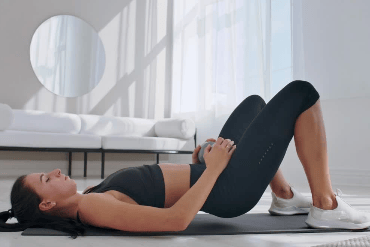Gentle Somatic Movement Exercises
At its essence, Gentle Somatic Movement is “exercise” for the brain. The Somatic Movements are designed to provide sensorimotor feedback to the brain. They help the brain to notice where muscles are chronically contracted, and assist it in regaining control of those muscles, allowing them to release. The result is more freedom of movement with a vast reduction or complete elimination of pain and stiffness.
Utilizing slow, mindful movements, we apply a technique known as pandiculation to consciously contract and then release the target muscles. Pandiculation is very different from simply “stretching”. When stretching muscles, the sensorimotor feedback stops short of the brain at the spinal column. Not only can this elicit a Stretch Reflex, it prevents conscious engagement of the muscles. This is also why we never engage a muscle for more than three seconds, so as to avoid the Stretch Reflex. In this way, we’re able to gain awareness of our habitual movement patterns that have resulted in chronically contracted muscles manifesting the pain and stiffness we’ve endured.
The practice of Gentle Somatic Movements is very relaxing for both the body and the mind. Practitioners routinely report leaving class with an enhanced sense of peace and well-being, and a greater awareness of their Whole Self (Soma). They often find that practicing Gentle Somatic Movement improves their other practices as well as their everyday movements, allowing them to move with more pleasure and with greater ease.
The benefits of Somatic Movements include:
Release and reverse neuromuscular pain (chronic and acute)
Improve mobility, strength and coordination
Improve posture and appearance
Eliminate the need for guarding to protect injured areas
Improve physical fitness
Create a new freedom of movement
Ease breathing
Improve athletic skills
Long term pain relief from a host of common conditions
Life long skills that teach you how to regain voluntary control of habitually tight muscles
Greater physical independence and mastery of your movement
Increased flexibility, coordination, stress relief, balance and proprioception
A safe, easy and common sense alternative to drugs, and surgery
Somatic Movements are effective at relieve chronic aches and disabilities associated with as:
headaches
painful joints and muscles
neck, shoulder and back pain
sciatica
hip, knee and foot pain
repetitive use injuries
poor posture
accident traumas and whiplash
breathing problems
frozen shoulder syndrome
At its essence, Gentle Somatic Movement is “exercise” for the brain. The Somatic Movements are designed to provide sensorimotor feedback to the brain. They help the brain to notice where muscles are chronically contracted, and assist it in regaining control of those muscles, allowing them to release. The result is more freedom of movement with a vast reduction or complete elimination of pain and stiffness.
Utilizing slow, mindful movements, we apply a technique known as pandiculation to consciously contract and then release the target muscles. Pandiculation is very different from simply “stretching”. When stretching muscles, the sensorimotor feedback stops short of the brain at the spinal column. Not only can this elicit a Stretch Reflex, it prevents conscious engagement of the muscles. This is also why we never engage a muscle for more than three seconds, so as to avoid the Stretch Reflex. In this way, we’re able to gain awareness of our habitual movement patterns that have resulted in chronically contracted muscles manifesting the pain and stiffness we’ve endured.
The practice of Gentle Somatic Movements is very relaxing for both the body and the mind. Practitioners routinely report leaving class with an enhanced sense of peace and well-being, and a greater awareness of their Whole Self (Soma). They often find that practicing Gentle Somatic Movement improves their other practices as well as their everyday movements, allowing them to move with more pleasure and with greater ease.


To access all my Somatic Movement Exercises and classes
sign up below
